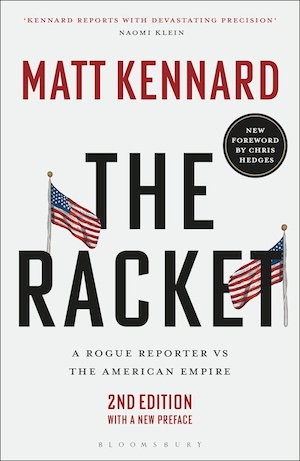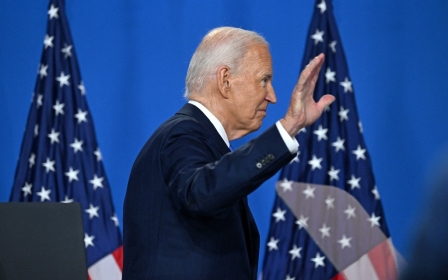The Racket: A chronicle of chaos wrought by the US empire around the globe

Matt Kennard’s The Racket, the second edition of which was published this summer, attempts to tackle head-on one of the most emotive questions of our political era: what kind of agent is the United States, and how do we deal with the negative effects of its overreach?
Speaking of a single principle that underpins all of Washington’s global operations might sound crude. After all, empires are complex undertakings, even during times of power decline - but Kennard is assertive in his verdict: the US is best understood at the receiving end of its global dealings.
There, beyond the theatre of “liberal values” and “development and democracy programmes”, emerges a simple nation with a lucid drive and an uncomplicated diet. You just have to observe it at close range.
Kennard was uniquely positioned to do precisely that through his work as an investigative journalist with the Financial Times covering the Pentagon, the White House, Wall Street and the City of London, among other areas.
Over a four-year period, he travelled with rare access across five continents, reporting from more than a dozen countries, including Bolivia, Mexico, Haiti, Palestine, Tunisia and post-Mubarak Egypt. Kennard speaks eloquently of the cultural “echo-system” that dominates newsrooms and ensures mainstream media’s unshakable deference to the status quo.
New MEE newsletter: Jerusalem Dispatch
Sign up to get the latest insights and analysis on Israel-Palestine, alongside Turkey Unpacked and other MEE newsletters
The Racket combines unparalleled access with the author’s immense frustrations, comprising a collection of observations and insights that he was unable to publish during his tenure at the Financial Times.
The book’s findings should not come as a surprise. The past few decades have seen the rising power and reach of multinational corporations, whose interests converge with hard military power and the overarching American political doctrine.
But the level of detail Kennard provides offers a desperately needed adjustment to this lens. Speculation about US political meddling and coercive global economic development programmes is one thing; being able to see the mechanics of it all up close is another.
American fingerprints
This book is essential reading for those interested in understanding the levers used by the US to customise the world to fit its purpose, from instigating coups in countries like Bolivia, to the painful, wholesale restructuring of Haiti in the aftermath of the 2010 earthquake.
The results are not just abject poverty and co-opted governments, but new political-economic formations that cannot engineer themselves back into national sovereignty. In Haiti, for example, the US push for a publicly funded but privately run education system meant that $700m of Haiti’s tax revenue had to be levied for the enterprise, while more than half of the country’s schoolchildren were locked out of education.
Beyond the disenfranchisement of swathes of the population, with no new tax revenues, the tax base was “all but destroyed”, Kennard said.
At sweatshops in Honduras, half of which are owned by US multinational companies, managers administer birth control pills to female employees each morning to ensure they can continue to work, Kennard found. Notes stipulating the hours during which workers are allowed to use the toilet are also common.
In Palestine in 2009, Kennard slept on the floor of a family home in the Sheikh Jarrah neighbourhood of occupied East Jerusalem, trying to mitigate the violence of settlers bent on forcing the family out. “I witnessed a microcosm of the slow-burn murder of a people,” he wrote. “No American who reads the mainstream newspapers or watches the corporate TV news would have had any idea this was happening.”
His investigations into various assassination attempts in Bolivia revealed that the US doesn’t even bother much with obscuring its fingerprints, knowing it cannot be held to account. Testimonies from workers, revolutionaries, government officials and disillusioned US diplomats make clear the crafty nature of American empire.
Kennard’s book drives home the vulnerable nature of our public cognitive terrain. The omissions of mainstream media acquire an acutely sinister character. The lack of resources for proper investigative journalism, alongside civil capitulation in the face of a growing culture of secrecy among western political establishments, feel like crucial deficits.
Western failures
When proponents of the western order defend the leaderships of western liberal democracies, many - at least those with measured consideration - will admit to the primacy of self-interest, while arguing that western societies have an edge owed to the strength of western civil society and the duality of purpose this brings into the mix.
Yet, from the failure of western civil society to stop the war on Iraq, to the unheeded demands for a ceasefire in Israel’s latest war on Gaza, it is hard to see where the power of civil society lies in the age of corporate power - and whether it has any at all. If the media is silent and our access to information is compromised, can we even speak of meaningful citizenship?
With the Gaza war being broadcast live and millions of people mobilising around the world, something new may slowly be emerging
Kennard paints a grim picture, but he somehow manages to rustle up optimism. With the proliferation of new media, he suggests, we stand a chance of rebuilding civil society, or at least of reconfiguring the cognitive landscape that is a cornerstone of this undertaking. With the Gaza war being broadcast live and millions of people mobilising around the world, something new may slowly be emerging.
During the Occupy Wall Street movement in 2011, Kennard mingled with protesters who vented their frustrations with the US financial system, telling him: “Both political parties are owned by the same guys.” Despite Occupy’s lack of focus, it still held the potential to develop into a mass movement, a Columbia University professor told Kennard at the time.
Had I read this book when it first came out, almost a decade ago, I might have indulged in an idle critique of its tone, at times too angry and perhaps too passionate for a cool-headed political appraisal. But today, upon the publication of its second edition, The Racket seems to have acquired a prophetic quality, our sensibilities only now catching up with it fully.
It could be that, as Kennard likes to stress, Palestine has finally stripped away all pretences. The bell that tolls for all today, albeit with some delay, is just as loud as it must have sounded to him back then.
Even his relentlessness seems apt, bringing to mind the monumental urgency we face in dealing with the impenetrable might of international corporations that are swiftly destroying our environment and our political landscape. This is an urgent, revelatory work - a must-read for anyone who wants to better understand the times we live in.
The views expressed in this article belong to the author and do not necessarily reflect the editorial policy of Middle East Eye.
Middle East Eye delivers independent and unrivalled coverage and analysis of the Middle East, North Africa and beyond. To learn more about republishing this content and the associated fees, please fill out this form. More about MEE can be found here.






